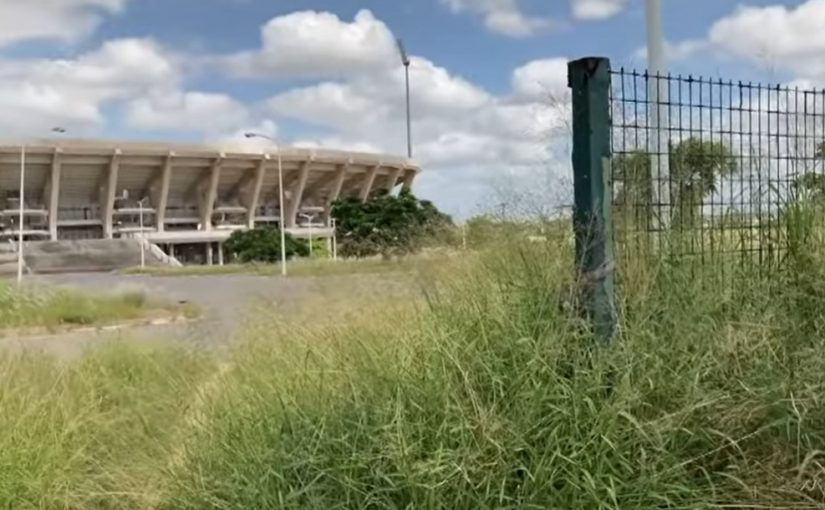Paratus Mozambique sponsors local talent at international Padel event in South Africa
Zimpeto Stadium: Maintenance and management may pass to South Africans – O País

File photo: TVM
The management of the Zimpeto National Stadium (ENZ) may be transferred to South African consortium Stadium Management South Africa, due to the inability of the Sports Promotion Fund (FPD) to properly maintain the infrastructure.
The Secretary of State for Sports (SED) is negotiating with the managers of Johannesburg’s FNB Stadium (commonly known as Soccer City) – the venue which hosted the opening match and final of the 2010 FIFA World Cup. [The company managing FNB Stadium is Stadium Management South Africa].
The Zimpeto National Stadium is Mozambique’s largest piece of post-independence sports infrastructure, built in the context of a failed bid to host the 2010 African Cup of Nations.
With construction priced at US$57 million, an amount made available by the Government of China, the largest venue in Mozambican football immediately generated more doubts than certainties as to its viability.
In fact, the absence of a consistent project for the profitability and professional management of the venue and associated spaces forced Mozambique’s state Sports Promotion Fund to spend around 54 million meticais [around US$845,000] a year in maintenance. This amount gradually rose to about 80 million meticais [US$1.2 million], representing a great financial burden on the state.
An untenable an increasingly expensive scenario, all paid for out the public purse.
Speaking on STV’s “Grande Entrevista” program, Secretary of State for Sports Gilberto Mendes explains how the contact with the South African company came about.
“There were two public tenders [for management and maintenance of Zimpeto National Stadium] that had no competitors. They had no answer,” said Mendes. “In the search for someone competent to manage the stadium, we made contact with the South African managers of the FNB Stadium who have extensive experience in the management of sports infrastructure and were willing to come here to see. They came, and we are negotiating to see if we can hand over management [of the stadium] to a professional manager.”
Attempts to avoid this option were not lacking. Recently, public-private management has been attempted, with the leasing of spaces for a variety of purposes. Gyms were opened, spaces were used for weddings and other festive events, and a beauty salon was even set up in one of the ticket offices.
But in vain! The amount collected proved less than what management needed to prevent the infrastructure becoming a white elephant.
Furthermore, it was revealed that we are light years away from innovative and creative infrastructure management.
It sounds like a lie, but it’s true, and the case made a lot of ink flow. The enclosure has become vulnerable and attracts criminal activity. The fence has been vandalised, and sanitary ware, office supplies and even players’ belongings stolen. Despite a police station being installed on the premises, this was only some of the human abuse of the infrastructure which hosted the ill-fated 2011 All-Africa Games.
Degraded grass, cornered Mambas
But misfortunes never come alone. The natural turf installed during construction in 2010 suffered wear and tear over time, to some extent because of misuse.
In 2014, the Defence Armed Forces of Mozambique celebrated its 50th jubilee on the unprotected grass of the Zimpeto National Stadium, accelerating the wear on the turf. Even so, the venue continued to host Mambas matches, but the poor state of the turf saw the African Football Confederation (CAF) fine the Mozambican Football Federation 256,000 meticais in 2021 after the Mambas versus Cape Verde AFCON match.
In fact, the turf should have been replaced in December, 2020. Venue manager, the Sports Promotion Fund, signed a contract to that end with the company that treats and maintains the ENZ turf. This process did not go at the speed that was intended in the period between the end of December 2020 and the beginning of 2021, because South African companies were on vacation during the festive season.
With no alternatives, the Sports Promotion Fund recalibrated the timetable for the replacement of the turf, in a process that would last four months.
This is equivalent to saying that, according to international quality standards, the period of four months is ideal for the turf to be implanted. There was, however, pressure, as the Mambas had scheduled a game with Cape Verde on 31 March. And, being the only venue approved by the Confederation of African Football [CAF], nothing could be done in terms of advancing its replacement. COVID-19 put piled on the pressure, with FIFA and the CAF postponing matches, as some countries did not have the health conditions to host games safely.
But there is another setback: the replacement of the turf should take place in the summer, when the turf fares better, compared to winter. This led to yet another postponement affecting the Mambas, who had commitments to host Côte d’Ivoire in September, 2021.
In 2021, the African Football Confederation (CAF) again rejected the Zimpeto Stadium due to the poor condition of the turf, lack of hygiene in the corridors, toilets, accesses and changing rooms, destroyed equipment, unprotected access to the teams’ parking area, poor lighting of the field for night games and absence of turnstiles.
In a unique case, which scandalised Mozambican soccer fans, the Mambas were as a result forced to play some qualifying matches for the Qatar 2022 World Cup away from home. At home, the Mambas did not even manage and feed the dream of qualifying for the World Championship.
With soccer fans barely recovering from the hard blow of not being able to see the Mambas play at home, yet more bad news came their way. The National Stadium of Zimpeto will not, at least until September, be in a condition to host qualifying matches for the 2023 Africa Cup of Nations, hosted by Ivory Coast. Climate is, this time, pointed out as the main cause of the stadium not being ready for inspection.
“We probably won’t play at ENZ,” warned Gilberto Mendes, after the Mário Esteves Coluna Supercup match. “I was there yesterday (29-04) and, given the state of the grass, I doubt it will be ready in time for us to play here. We will probably play the next matches out of the country. I we play at Zimpeto now, we run the risk of ruining everything that has been done all this time. There is a lot of investment that was made there. If you play there, it could spoil all the work that was done.”
Days later, the Mozambican Football Federation confirmed, on its website, that the Mambas will face Benin in neighbouring South Africa, in a 1st round qualifying match for the AFCON 2023 Group L.
The turf to be laid currently has an average lifespan of two years, after which it will have to be replaced.
By Aristides Cavele
Watch The TVM report on Zimpeto National Stadium, broadcast around three weeks ago.












Leave a Reply
Be the First to Comment!
You must be logged in to post a comment.
You must be logged in to post a comment.